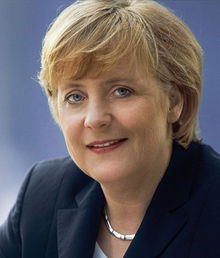Germany's Merkel defends reform plans at union congres
Chancellor Angela Merkel told German union members Wednesday they must face the need for further economic reform, drawing whistles and jeers as she defended plans to raise the retirement age and increase tax. Merkel, a conservative, took office in November at the head of a "grand coalition" with predecessor Gerhard Schroeder's Social Democrats.

The alliance forced her to water down plans to reform the labor market. However, unions already unsettled by Schroeder's efforts to revamp the welfare state still oppose her government's plans to raise the retirement age to 67 from 65 and to loosen workers' legal protection from dismissal. "We need change," Merkel said in a speech to Germany 's labor union federation. "We must keep what has proven its worth and change what burdens us today."
"Those who do not face the right questions will in the end come into question themselves," she said, drawing whistles and jeers from delegates. "There is no way around structural reforms with them, a lot will be difficult, particularly at the beginning, but without them nothing will succeed."
Merkel also said she opposes union calls for a new minimum wage of Ђ 7.50 (US$9.64) per hour although she added that companies should not pay "immoral wages." Merkel's government is pushing through a raft of tax increases aimed largely at getting the country's budget deficit within a European Union-imposed limit next year, after several years of overshoots.
The most prominent measure is a hike in the value-added tax paid by consumers, to 19 from 16 percent, in January. Opposition and business leaders worry that will hurt the economy, although Merkel noted that some of the money will go toward reducing high non-wage labor costs. "Saving hurts," Merkel acknowledged. "But there is no way around this: we must stabilize our budgets."
"We have no right to lessen the chances of future generations by building up debts today," she said. As Merkel spoke, a group of delegates held up a banner in front of her that read: "Grandpa, 66, has to work. Grandson, 20, is unemployed."
The unions traditionally have been allies of the Social Democrats. However, the labor union federation on Tuesday elected a member of Merkel's Christian Democrats, Ingrid Sehrbrock, as its new deputy chairwoman. A poll this week suggested that the popularity of both major parties is declining after a good start by Merkel, helped by her assured performance on several trips abroad.
The poll, published Tuesday, showed support for Merkel's party at 35 percent three percentage points down from a week earlier and just below its disappointing result in last year's election. It found 28 percent support for the Social Democrats, a one-point improvement. The biggest opposition party, the pro-business Free Democrats which vociferously opposes the VAT hike gained two points to 13 percent. The Forsa polling agency surveyed 2,499 people from May 15-19. It gave a margin of error of plus or minus 2.5 percentage points, reports the AP.
N.U.
Subscribe to Pravda.Ru Telegram channel, Facebook, RSS!


